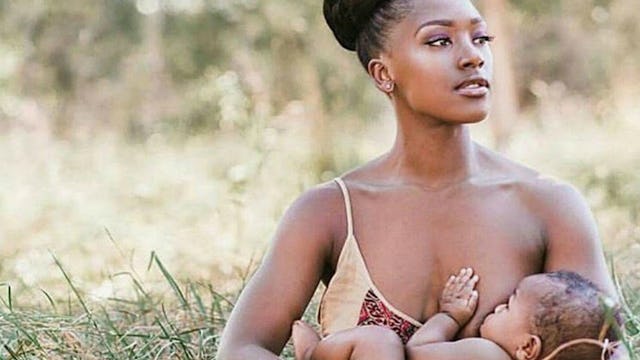This Is Why We Need A Black Breastfeeding Week

National Breastfeeding Month highlights the struggles and joys that breastfeeding mothers experience. But soon after its inception in 2011, three black moms realized that the month didn’t really touch upon the specific issues that black breastfeeding moms encounter.
So they took matters into their own hands: They started their own week, Black Breastfeeding Week, to draw attention to the different challenges black women face when they breastfeed and to celebrate and promote the fact that black women do, in fact, breastfeed.
Co-founder Anayah Sangodele-Ayoka described Black Breastfeeding Week’s conception to the Huffington Post:
“World Breastfeeding Week is typically at the beginning of National Breastfeeding Month [which] had already existed for a few years to be the entirety of the month,” says Sangodele-Ayoka. “So we said, ‘You know what, we don’t need anybody’s permission. We’re just going to take the final week and let everybody know now that’s Black Breastfeeding Week and go from there.’ And that’s how it happened.”
Yep, these women aren’t screwing around. They are clearly badass AF. Love it.
But in all seriousness, the need for a Black Breastfeeding Week is real because there are some striking inequities that exist when it comes to opportunities, awareness, and resources for black women who want to breastfeed. Obviously, Black women are as capable of breastfeeding as white women, but there are racial disparities built into our society — stemming back hundreds of years, in fact — that make breastfeeding as a black woman a whole different ballgame.
On the Black Breastfeeding Week website, another co-founder, Kimberly Seals Allers, discusses some of the specific reasons that Black Breastfeeding Week was founded. And these are issues that we all need to become more aware of.
First, Seals Allers points out the fact there is a huge racial gap for black women when it comes to breastfeeding initiation. For example, according to a CDC report from 2008, up to 75% of white women initiated breastfeeding, whereas only 58% of black mothers did. And that sort of disparity has remained constant even as breastfeeding initiation rates have risen somewhat over the years.
Seals Allers also mentions the unconscionably high infant mortality rate among black babies (black babies are twice as likely to die as white babies), and how breastfeeding could protect them, significantly lowering that rate. (Keep in mind that infant mortality doesn’t just represent what happens directly at or after birth, but what happens to babies in the first year of life, so breastfeeding could certainly have an impact here).
In the same vein, says Seals Allers, breastfeeding could protect black children from diseases that are common in black communities, including upper respiratory infections, Type 2 diabetes, asthma, and childhood obesity — all of which breastfeeding is known to protect against.
But it’s not just about those very real health concerns. Black Breastfeeding Week is also about the fact that even within the breastfeeding awareness and support community, black culture is significantly underrepresented.
How are black women supposed to breastfeed more if they don’t see other black women doing it? How are they supposed to feel supported when most —by far — breastfeeding helpers and lactation consultants are white women who know little of the struggles or culture of a black woman in the U.S. at this time?
And let’s not forget that black women have what Seals Allers calls a “complex history” when it comes to breastfeeding, as many black women still recall that black slaves were used to wet nurse their slaveholders’ children, and this painful historical fact still plays into the narrative of breastfeeding for so many black women.
Still, the founders of Black Breastfeeding Week do not want to let all of this define them.
“This is a week to discuss the lack of diversity among lactation consultants and to change our narrative,” says Seals Allers. “A time to highlight, celebrate and showcase the breastfeeding champions in our community who are often invisible. And to make sure that breastfeeding leadership also reflects the same parity we seek among women who breastfeed.”
BINGO. Can these amazing women get a freaking round of applause? Their tenacity and wisdom are totally inspiring.
A major part of the week is to showcase the strong black women who are out there, breastfeeding proudly and without shame. So social media is often flooded during Black Breastfeeding Week, with inspiring photos of black breastfeeding moms doing their thing…
…rocking it like no one’s businesses…
….and looking like the beautiful breastfeeding goddesses they are.
https://instagram.com/p/BJwZRgfBTf6/
Black Breastfeeding week is always the last week of August, and falls on August 25–31 this year. The theme for 2018 is #LoveOnTop, and you can follow the Black Breastfeeding Week Facebook page for updates on events for the week and look for #BBW18 and #BlackBreastfeedingWeek across social media platforms.
This article was originally published on